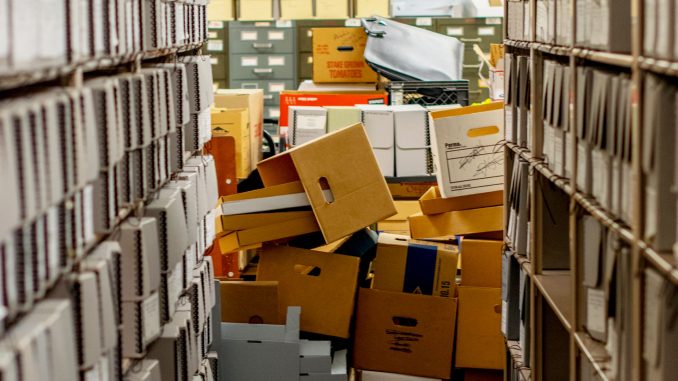
Back in 1980, Ken Finkel ran into former Inquirer photographer Chuck Isaacs in Center City.
Isaacs told Finkel the Inquirer and the Daily News were getting rid of their “photograph morgue,” which was the newspapers’ collection of thousands of old photos from past print issues.
Finkel was working for the Library Company of Philadelphia at the time and convinced his boss, Edwin Wolf 2nd, to help save some of the photos. Wolf called an old friend who owned a moving and storage company to ask if he could temporarily store the photos.
After a few years in storage, they finally made their way to the Urban Archives, a part of Temple University Libraries’ Special Collections Research Center.
“It’s like pulling something back from the edge of oblivion,” said Finkel, a history professor. “I was always proud to be part of that because otherwise they would’ve been gone forever.”
Established by the history department in 1967 and incorporated into Temple University Libraries five years later, the Urban Archives celebrates its 50th anniversary this year.
The Urban Archives also houses 7 million news clippings from the Philadelphia Evening Bulletin, a newspaper active from 1884 to 1978, and local TV newsreel footage from KYW and WPVI. In addition, it contains records from many Philadelphia-based organizations documenting the city’s political, economic, social and physical development during the last three centuries.
On Oct. 20, Temple University Libraries hosted a symposium at the Temple Performing Arts Center to recognize the achievements of the Urban Archives. In conjunction with the event, display cases placed on the lower level, first floor and mezzanine level of Paley Library will highlight documents from the collection through late January. Each display focuses on a particular theme, like education and activism.
Prior to the 1960s, Margery Sly, the director of the Special Collections, said historians examined a lot of “great white men,” like American presidents and governors, but often disregarded the stories of ordinary people, especially people of color.
“In the ’60s, there was a rise in interest to look at just the average people, immigrants and underserved populations,” Sly said.
This academic trend is known as “social history” and, coupled with rising civil unrest in cities, it compelled the history department to found the Urban Archives, according to a 1975 statement by then-Director Fredric Miller. The collection began to catalog records from organizations like the Committee of Seventy, a Philadelphia-based civic reform group founded in 1904, and the Urban League of Philadelphia, a branch of a national advocacy group for African-Americans, which was founded in 1917.
Finkel said for many years, scholars paid less attention to the city’s 19th and 20th century history.
“Everybody, as you can imagine, in Philadelphia has a real problem shaking 1776,” Finkel said. “It’s the default setting we’ve had.”
One of the Urban Archives’ most prominent 20th century documents is its collection of Philadelphia Special Investigation Commission records, which includes information on the MOVE bombing.
MOVE, a Philadelphia Black liberation group, had multiple conflicts with the Philadelphia Police Department in the 1970s and ’80s. In 1985, police dropped a bomb on MOVE’s headquarters in West Philadelphia, killing 11 members, including five children. The fire from the bomb destroyed more than 60 rowhomes.
“It’s a very rich collection and there’s almost always somebody wanting [to use the collection] to do a documentary or a story,” Sly said.
Carter Reynolds, a sophomore political science and economics major and Special Collections student worker, said he had never learned about MOVE until he had to photocopy documents produced by the Philadelphia Special Investigation Commission. The commission, appointed by then-Mayor Wilson Goode, conducted public hearings and wrote a report criticizing the actions of the city government.
“Just skimming over the papers, it was really interesting to read,” Reynolds said.
Timothy Patterson, an education professor who teaches social studies courses, uses the archives to teach his students how to better use primary sources. He wants to help his students, who will be teachers themselves, assist their future students in being critical evaluators.
Patterson added that it’s important to preserve the archives for future questions by historians and academics.
“We have to preserve evidence from the past,” Patterson said. “We have to present as much as we can so that that evidence exists. Historians don’t write in a vacuum.”
Last Friday, Reynolds leafed through envelopes filled with Philadelphia Evening Bulletin clippings and alphabetized them by their keywords. The envelopes were recently transferred into new acid-free storage containers, a part of the Urban Archives’ five-year preparation for moving into the new library.
Sly said the new library will provide Special Collections with a dedicated classroom to conduct its own programming. Special Collections also plans to digitize more past archived material.
“In olden days, it used to be that stuff was stashed in closets and attics,” Sly said. “But now the digital is more challenging. … A lot of that is much more ephemeral. So if you don’t capture it up front, you might not get it.”
One of the Urban Archives’ digital-focused projects is a collaboration with organizers from the Women’s March on Philadelphia, which was one of more than 600 protest marches held in the United States on Jan. 21, the day after President Donald Trump’s inauguration. On the day of the march, Urban Archives staff hosted a collection station to gather signs and other materials. Later, they “harvested,” or digitally preserved, the content from the Women’s March on Philadelphia website and Facebook page.
Despite the changes brought by the spread of digital technologies, Sly said the mission of the Urban Archives to preserve Philadelphia’s social history remains the same.
“Everybody has a story to tell and we want to be able to make sure those are captured and preserved,” she added.
CORRECTION: This article previously misstated how the Urban Archives acquired the photographs from the Inquirer. Ken Finkel was also misquoted.
[starbox id=”emilyscott,ianwalker”]

Be the first to comment